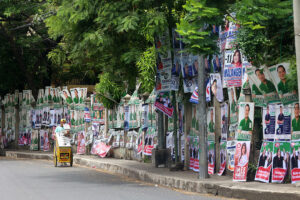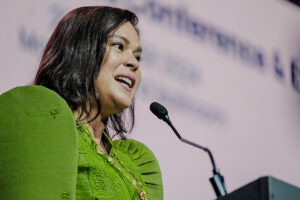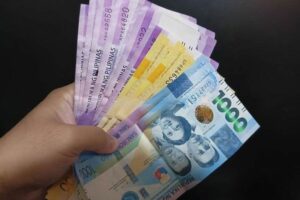Clash of clans: Dynasties to slug it out in Philippine midterm elections

By Kenneth Christiane L. Basilio, Reporter
ANTONIO A. ROMANO, a 49-year-old taxi driver from Quezon City, is sick and tired of the same familiar names and faces that he sees every time he votes, many of them from well-entrenched political families.
“Politicians these days have become incredibly shameless,” he told BusinessWorld. “It’s as if politics has become their business, one that they fully own.”
Philippine midterm elections this month are expected to remain a family affair, with dynastic clans and celebrities likely to dominate the contest that analysts see as a proxy war between the Marcos and Duterte families.
More than 18,000 seats nationwide are up for grabs in the midterm elections on May 12, held every three years so Filipinos can vote for 12 of 24 Senate seats, more than 300 congressmen and thousands of local officials in every province, city and town.
“Dynasties have become more aggressive in contesting seats beginning in the past decade,” Arjan P. Aguirre, who teaches political science at the Ateneo de Manila University, said in a Facebook Messenger chat, citing a “noticeable increase” in their presence at the House of Representatives, Senate and local offices.
Maria Ela L. Atienza, a political science professor at the University of the Philippines, said political families in the Philippines have existed before martial law in the early 1970s, but their numbers multiplied after the ouster of the late president Ferdinand E. Marcos, Sr. in 1986.
“Many dynasties have no more shame in running for multiple positions, with ‘fat’ dynasties increasing,” she told BusinessWorld in a Viber chat.
For years, public office in the Philippines has been treated like heirlooms, passed down by parents to their children and their grandchildren. It has also been a source of quarrels between family members who vie for the same posts.
About two-dozen political dynasties are each seeking at least five government seats across all government levels in this year’s midterm elections, according to a report by the Philippine Center for Investigative Journalism.
Political dynasties in the Philippines fall into three distinct categories, each reflecting the number of seats they take and the influence they yield, said Julio C. Teehankee, a political science professor at De La Salle University.
“Political dynasties in the Philippines can be distinguished between ‘thin’ dynasties, where only one family member occupies an elective position successively, and ‘fat’ dynasties, where many family members simultaneously occupy elective positions,” he said in a Facebook Messenger chat.
“If more than four or five family members occupy elective positions, they may already be considered ‘obese,’” he said. “Obese dynasties are dangerous to the health of democracy.”
Dynastic politicians are inherently anti-democratic because they put their personal interests before the public they’re supposed to serve, said Cleve V. Arguelles, chief executive officer and president at Philippine think tank WR Numero Research.
“They undermine democratic demands for transparency and accountability, ensuring that elections serve as coronations rather than actual competition for votes,” he said via Viber. “Political dynasties exist to monopolize power, shutting out competition and securing their rule.”
PROFITABLE BUSINESSPolitical clans are interested in keeping their regional strongholds to shape policymaking in ways that align with and benefit their business interests, Danilo A. Arao, convener of election watchdog Kontra Daya, said.
“Political dynasties use their power and influence to promote their business interests,” he said via Messenger chat. “They pass laws that cater to their interests… [and] they are able to get lucrative government contracts.”
Dynastic politicians also use their position to block competition and offer business and economic opportunities to their kin, Mr. Arguelles said.
More than 60 political dynasties have links to construction companies, according to a 2022 study by the Ateneo de Manila University.
“The presence of ‘fat’ dynasties and politicians’ ownership of local businesses are both directly linked to poverty incidence,” it said. “The monopolization of key industries can skew local policies and economic gains to local politicians and their clients rather than the entire province.”
Dynasties tend to flock to the construction industry because it is among the most profitable ventures in the country, said Nigel Paul C. Villarete, senior adviser on public-private partnerships at technical advisory group Libra Konsult, Inc.
“It is the main portal for infrastructure development… which makes it profitable,” he said via Viber. “While national development rests on economic and social development, both require infrastructure as the basis for their execution.”
Politicians are “naturally inclined” toward the building sector because they are responsible for drafting and executing national development plans including infrastructure projects, Mr. Villarete said.
He added that politicians use their connections to win state contracts, causing “undue disadvantage” to the government.
Political dynasties also worsen economic inequality and stifle socioeconomic progress, Jose Enrique “Sonny” A. Africa, executive director at think tank IBON Foundation, said in a Viber message.
They often craft policies that foster a “long-term, patron-client” dynamic with their constituencies by channeling state resources into short-sighted financial programs that prioritize immediate relief over sustainable development, he added.
“They thrive in backward political ecosystems of poverty, patronage and dynastic entitlement,” Mr. Africa said.
Ms. Atienza blames weak institutions and poor government service for the rise of political clans. “When the state is unable to provide basic services to citizens, political families find a way in providing patronage and dole-outs to poor people.”
Weak political party structures have also allowed political dynasties to “metastasize,” she pointed out.
Politicians with business links have infiltrated the Philippines’ party-list system, with about 15 groups having ties to various enterprises during this election cycle, according to a Kontra Daya report.
The party-list system was created under the 1987 Constitution to allow underrepresented sectors to participate in the lawmaking process. It was expanded in 2013 after the Supreme Court ruled that political parties could also participate in the party-list system.
Mr. Aguirre said political dynasties would continue to thrive if no action is taken against them.
“This phenomenon will continue if there are no alternatives out there who can challenge these dynasties and we don’t reform our institutions to help them resist any form of capture from powerful families,” he said.
“We can start to put an end to this dynastic prevalence in the Philippines by pushing institutional support for party development, reforming the party-list system and strengthening participative governance mechanisms at various levels of government,” he added.
The Commission on Elections (Comelec) holds the power to disqualify political dynasties even in the absence of an enabling law banning them under a 2016 youth council law, according to Michael Henry Ll. Yusingco, a constitutionalist and senior research fellow at the Ateneo Policy Center.
“The Comelec can disqualify dynastic candidates on the basis of Article II, Section 26 of the Constitution in relation to the definition of a political dynasty found in Section 10 of the Sangguniang Kabataan Reform Act,” he said.
The 1987 Constitution prohibits dynasties, but an enabling law has not been passed for 37 years.
The law cited by Mr. Yusingco bars candidates who have relatives who are incumbent officials from the national down to the village level from running in youth council elections.
The Comelec is still studying whether it could use that law to disqualify dynastic politicians, Election Chairman George Erwin M. Garcia told BusinessWorld in a Viber message.
Filipinos have the power to reject political clans even in the absence of an enabling law against them, Mr. Yusingco said.
Mr. Romano, the taxi driver, vows to do just that.
“I promise not to vote for members of any political clans on May 12,” he said. “They don’t accomplish anything for ordinary Filipinos. It’s all just self-serving.”




